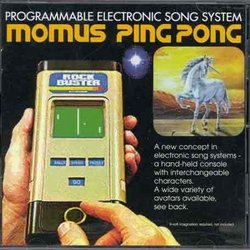As long as you are morally good in your acts
Ryan Hennessy | Albany, NY | 03/12/2002
(4 out of 5 stars)
"Momus (Nick Currie) is one of the most interesting people in music today. Not because he has some crazily eccentric personality (although that's true too), but because he actually has a ton of ideas in his head, most of which only this guy could come up with. Momus may also be the smartest person in music today. While other genius musicans may put more thought into the music or lyrics that are smart while still being accessable, Momus is more in-your-face smart. The lyrics are sometimes so far over my head, that I just don't want to try to understand. The music of Ping Pong however, is pure Casio-pop. He records on a hard disk alone, making all the music on his keyboard and a guitar. It's all very Casio-like and Momus throws in some old video game sounds and some harpsicords (an indicator of his next album's direction) for good measure. The sound is very easy to listen to, but it's the intelligence, almost up-right pretenciousness, content, and sheer length of some songs that would keep them from being played on the radio. It's pop taken to some extremes. Same goes for the lyrics. He indulges in some desires and brings them to the next level.As I said, the lyrics are very far out there, but luckily, Momus likes keeping it all in good fun. For example, the second track, "His Majesty The Baby," is about how babies are treated by women. It's like they're kings.... The fact that he rhymes the words "despot" and "taspot" does little to get in the way. The point is made. Once you get past the near word game trickiness of "I Want You But I Don't Need You" it all makes perfect sense. ("I want you, and I want you to want me to want you / But I don't need you / don't need you to need me to need you.")"Shoesize of the Angel" is the reversal of an earlier Momus song, "Hairstyle of the Devil," which he admits was a calculated attempt at something radio-friendly, maybe making him a one hit wonder. The idea of the original was that there's a girl you want to get with, but she has a guy already, and it's about this mysterious man's unknown charisma. "Shoesize of the Angel" isn't just the reversal of the idea, that you know the guy is a jerk, but the actual melodies of the original are played backwards. So the comment about it having the bassline from "Rapper's Delight" is completely false. It's just the bassline from the earlier song reversed. "The Age of Information" deals with the loss of privacy that will occur in the future when technology puts all of your history out there. Instead of going to crazy measures to insure that everyone's personal lives remain private, the song reccomends that you act morally good so that you won't be afraid of what people will find out about you. Also, the music in this song is taken to the Casio's ethereal max."Space Jews," although played completely straight-faced, is the weirdest song of the pack. The theory is that Jews are a superhuman race of beings that came from outer space a long time ago. They were sent to improve the human race. That's why they win all the Nobel Prizes... apparently. "My Kindly Friend The Censor" is a witty love song with all the dirty words taken out by the censor. ("I begin to (tabboo verb) you / As you gaze back with a smile / Which almost triggers my (word missing) / But don't (unacceptable)") It's a riot."
Brilliant!
progers@wii.com | Portland, Oregon | 07/10/1999
(5 out of 5 stars)
"Momus is completely brilliant. If you like blur, XTC, petshop boys, but wish they were more inteligent and checky? Then you will love Momus. Just listen to "His Magesty The Baby." If this does not win you over, then don't buy this album."
The feast is full and varied, as always.
Ryan Hennessy | 07/31/1999
(4 out of 5 stars)
"Definitely a deeply satisfying purchase. Momus is an artist worth coming back to over and over, if only to see what's changed. As a huge fan of Nick Currie's early body of work, I found his drift into more electronic forms of music (many years back now!) disappointing at first. But I was rewarded in sticking with it, as I came to realise his music will always be a reflection of the ever-changing whirlpool of modern cultures and classical works that he so relentlessly immerses himself in - and therein lies it's charm."


 Track Listings (16) - Disc #1
Track Listings (16) - Disc #1